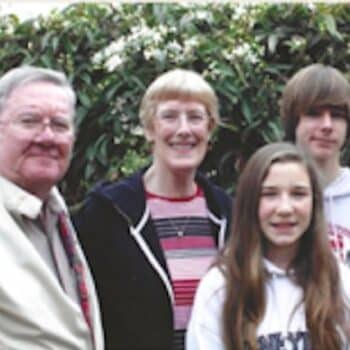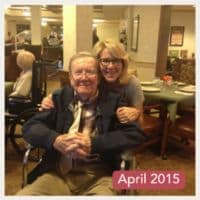Grief Before the Loss: A Journey Through Caregiving and Compassion

Find ways to be as gentle with yourself as you want to be with your person. Gentleness begets gentleness. And from there, we find our way to compassion.
March 21, 2025
Christy is a Licensed Educational Psychologist, author, speaker, and coach. In her book Building a Legacy of Love: Thriving in the Sandwich Generation, she shares her journey as a working mom who is caring for parents with dementia. A retired school psychologist, she now delivers keynotes, workshops, and coaching to support caregiving families. Christy co-hosts the podcast Untangling Alzheimer’s & Dementia, and is a member of the Board of AlzAuthors. Christy has also been featured in Women’s World Magazine.
My father was struggling to feed himself and I was having none of it. I was impatient and rude. I think I may have growled or grunted.
I looked up to see the face of my soon-to-be 18-year-old son looking at me, horrified. He silently mouthed the words, “Mom. Be nice.”
It was a Sunday night in February of 2015, and after taking my parents to Church, my family of four — my husband, teenage son and daughter—brought them to our home for what I hoped would be a nice meal designed to evoke fond memories from years past. I’d found some fresh cracked crab, warmed up sourdough flutes, and prepared a salad. As a native Californian living in Ohio with her husband and three children, my mother had introduced us to foods she’d loved like cracked crab and artichokes — foods that seemed exotic in Ohio back in the ‘70’s.
When we sat down to dinner, I felt nervous because I really wanted to engage my parents, Peggy, 82 and Charlie, 83, in a truly sensory experience. They’d retired in Northern California 18 years prior and had enjoyed golfing and travel, involvement in their Church, and being active in the lives of my two children and their other grandkids who were spread across the country. However, several years earlier, they had begun to decline. Both were diagnosed with some form of dementia. My father, who had a stroke at age 62, was diagnosed with vascular dementia in 2012, while my mother, who had breast cancer at age 61, was diagnosed with early stage Alzheimer’s, also in 2012. I was now their person – Health Care Advocate and Legal Power of Attorney.
Soon after we sat down, I noticed how slow my father was at getting started on his meal. He seemed confused by the activity at the table. He needed my help to put food on his plate. He was not able to use a crab fork to dig for the sweet crab meat. He wasn’t even able to use a regular fork to eat salad.
I was shocked.
However, my compassion seemed to be stuffed way down below my horror at seeing how much he had declined. I was impatient and petulant with him, like a toddler in the midst of a tantrum.
Both my kids were very close to their grandparents, and my daughter had become an expert in answering the same questions my mother asked repeatedly. My son often snickered at some of the colorful expressions my father used, since his dementia seemed to have compromised his social skills. They were both incredibly compassionate.

However, for me, as I comprehended what my son was telling me, it was as if he’d thrown a bucket of cold water on me. I was frozen and ashamed. Who was this person I’d become at this moment? More importantly, my children were seeing this.
I pulled myself together, gave my father a spoon and helped him to eat. My daughter engaged my mother in conversation and my son and husband carried the conversation for the rest of us.
I now know the term “Anticipatory Grief.” However, in that moment, I only knew that I was truly grieving witnessing my parents decline. I’d been so busy for the last few years managing all the things – their money, their doctor appointments, their living arrangements, being a mother to teens, all while working full time.
After dinner, my husband drove my parents back to their Assisted Living home. I gathered my children and apologized for my behavior. It wasn’t long before we were all in tears. We talked about grief, theirs and mine. I let them know how proud I was of how they treated my parents, and me, for that matter, because I would never have wanted them to act as I had that night. They were so forgiving.

What I know now is that grief often comes to us long before we have lost someone. We grieve for what is already lost, changes in relationships, the knowledge that we know what is ahead of us and what a loss that will be. We grieve for the loss of our identity without this person who has been a huge part of our life. Grief, though, does not always show up as tears. It can show up as anger, resentment, denial, anxiety, and frustration, as well as deep sadness.
I learned to listen to my body and my inner voice during my caregiving years. I also learned to forgive myself for not being perfect. I learned to forgive others, as well. Those folks who no longer invited my parents to events or didn’t have time to visit? Grief may have visited them too. And I had to let go of all the “shoulding,” on myself and others as I began to realize most of us are doing the best we can.
Find ways to be as gentle with yourself as you want to be with your person. Gentleness begets gentleness. And from there, we find our way to compassion.